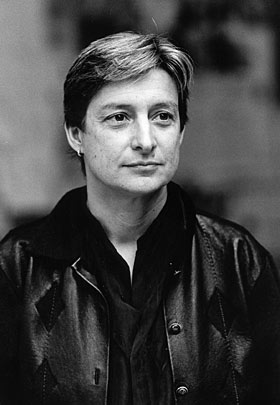 Ms. Butler: "It happened last year, some time, I come to door, and there is this man and he says: "excuse me, Mister..., Madam..., Mister, Madam..." He couldn't get through it. I kinda leaned forward and asked "is it really important to determine my gender in order to check minibar?" Of course, I humiliated him and immediately felt really bad. And this was also a class moment, and I was not sensitive to that. He's a worker, he doesn't know, what to do with people like me. And then he said: "of course, not, Mister..., Madam..., Mister..., Madam." And then, the next day, I go to the pool. The same hotel. I then was in the ladies' locker room changing and a young woman comes in and says: "Oh, oh, do the ladies and the blokes change together?" "No, no, I don't think so. This IS for the ladies," I said. And she said: "Oh, sorry, sorry, I was so confused!" Then I leaned forward, making up from my sin of the previous day and I said: "I am a lady." Which is the first time in my life that I ever said it." |